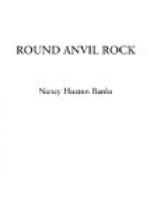William Pressley turned gravely and was about to protest against such absurd superstition, but Philip Alston interfered tactfully, to assure the lady that she was quite right, that it could not fail to benefit almost any one to breathe on anything, especially if the breathing were very deep and very early in the morning.
“And then the new doctor knows how to cure the plague, aunt Penelope, dear,” said Ruth, suddenly looking up from the things on the candle-stand. She was always the peacemaker of the family. “The Sisters told me. They are not afraid now that he has come. They were never afraid for themselves; it was for the children—the orphans. They said that little ones were dying all over the wilderness like frozen lambs.”
“This new doctor is a most presumptuous person,” said William Pressley, with the chilly deliberation which invariably marked his irritation. “He refuses to bleed his patients or to allow them to be bled. These unheard-of objections of his are levelled at the fundamental principles of the established practice and calculated to undermine it. Every physician of reputable standing will tell you that bleeding is the only efficacious treatment for the Cold Plague, and that it is entirely safe if no more than eight ounces of blood be taken at a time, and not oftener than once in two or three hours."[1]
[Footnote 1: “Medical Repository,” 1815, p. 222.]
No one said anything for a moment. When William Pressley spoke in that tone, which he frequently did, there seemed to be nothing left for any one else to say. The subject appeared to have been done up hard and fast in a bundle and laid away for good and all. The judge was dozing again, Philip Alston was still gazing at Ruth, Miss Penelope was busy over the coffee-pot, and the widow Broadnax was watching every movement that she made. It was Ruth who replied after a momentary pause. She never lacked courage to stand by her own opinions, timid and gentle as they were; and she spoke now firmly though gently:
“But, William, just think! These were little bits of babies. Such poor, weak, bloodless little mites anyway. And it is said that the greatest pain and danger from the plague is from weakness and cold. The strongest men shiver and shiver till they freeze out of the world.”
William Pressley bent his head in the courtesy that stings more than rudeness. He never argued. He had spoken; there was no need to say anything more. So that with this bow to Ruth he turned to Philip Alston and again took up the topic which he was so anxious to resume. It had already been interrupted, he thought, by far too much unimportant talk. Ruth looked at him expectantly when he started to speak, but he was looking at Philip Alston and spoke to him.
“You have, I suppose, sir, mentioned to my uncle what you so kindly suggested to me, in the event that the attorney-general should resign on going to Tippecanoe.”




